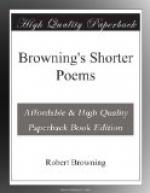Browning, like all great poets, knew life widely and deeply through men and books. He was born in London, near the great centres of the intellectual movements of his time; he travelled much, especially in Italy and France; he read widely in the literatures and philosophies of many ages and many lands; and so grew into the cosmopolitanism of spirit that belonged to Chaucer and to Shakespeare.
In all art human life is the matter of ultimate interest. To Browning this was so in a peculiar degree. In the epistolary preface to Sordello, written thirty years after its first publication, he said: “My stress lay on the incidents in the development of a soul: little else is worth study.” This interest in “the development of a soul” is the keynote of nearly all his work. To it are directly traceable many of the most obvious excellences and defects of his poetry. He came to look below the surfaces of things for the soul beneath them. He came to be “the subtlest assertor of the Soul in Song,” and like his own pair of lovers on the Campagna, “unashamed of soul.” His early preference of Shelley to Keats indicated this bent. His readers are conscious always of revelations of the souls of the men and women he portrays; the sweet and tender womanhood of the Duchess, the sordid and material soul of the old Bishop of St. Praxed’s, the devoted and heroic soul of Napoleon’s young soldier, the weary and despairing soul of Andrea del Sarto,—and a host of others stand before us cleared of the veil of habit and convention. The souls of men appear as the victors over all material and immaterial obstacles. Human affection transforms the bare room to a bower of fruits and flowers; human courage and resolution carry Childe Roland victoriously past the threats and terrors of malignant nature, and the despair from accumulated memories of failure; death itself is described in Evelyn Hope, in Prospice, in Rabbi Ben Ezra, as a phase, a transit of the soul, wherein the material aspects and the physical terrors disappear. In Browning’s poetry, the one real and permanent thing is the world of ideas, the world of the spirit. He is in this one of the truest Platonists of modern times.
To many young readers this method in art comes like a revelation. Other poets also portray the souls of men; but Browning does it more obviously, more intentionally, more insistently. It is well, therefore, to have read Browning. To learn to read him aright is to enter the gateway to other good and great poetry.
Out of this predominating interest in the souls of men, and out of his intense intellectual activity and scientific curiosity, grows one of Browning’s greatest defects. He is often led too far afield, into intricacies and anomalies of character beyond the range of common experience and sympathy. The criminal, the “moral idiot,” belong to the alienist rather than to the poet. The abnormalities of nature have no place in the world




